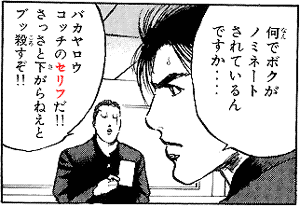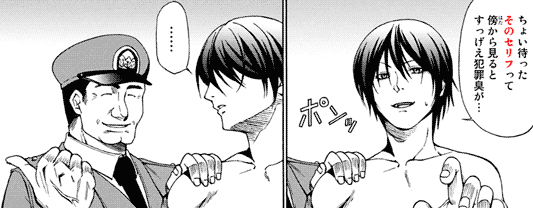In Japanese, serifu 台詞, also spelled serifu セリフ, refers to one's "lines" of dialogue. That is, the stuff that they say.
Everything that's inside a speech balloon in a manga is a serifu, because it's what the characters say. The "lines" a voice actors speaks in anime are their serifu.
The word serifu is also used to say "that's my line!" in Japanese, that's my serifu. In the sense of "it's me who should be saying that."
Although koso こそ can also mean something along those lines, koso tends to be used in a good way: it's I who should be thanking you, it's I who should be saying sorry, while serifu tends to be used in a bad way: you stole my line, why are you telling me this? It's I who should be telling you that.
Examples
- Context: a class full of delinquents decides to try to find out who's the strongest delinquent around. Kamiyama 神山, who's not a delinquent, was nominated as a possible strongest.
- nande boku ga nomineeto sareteiru-n-desu ka....
なんでボクがノミネートされているんですか・・・・
Why am I being nominated....? - baka yarou
バカヤロウ
[You] idiot. - kocchi no serifu da!!
コッチのセリフだ!!
[It] is my side's line!!
I should be asking that, not you.
I also have no idea, and I want to know, too! - sassato sagaranee to bukkorosu zo!!
さっさと下がらねえとブッ殺すぞ!!
If [you] don't withdraw immediately [I'll] murder [you]!!
- Context: Kitahara Iori 北原伊織 is talking with someone that says something that could be misinterpreted badly.
- choi matta
ちょい待った
Wait a bit. - sono serifu tte {hata kara miru} to suggee hanzai-shuu ga...
そのセリフって傍から見るとすっげぇ犯罪臭が・・・
That line, if {seen by a third-person}, [it] [has] an incredibly criminal smell. (literally.)
If someone hears what you said without context, they'll think it's a crime.
- hata kara miru
傍から見る
To see from the sidelines, in the sense of how an onlooker interprets a situation they aren't involved in, without full context. - suggee - same as sugoi すごい, with changes in pronunciation.
- X-shuu
〇〇臭
[To have] an X smell. To reek of X. To appear to be X, such that other people can tell it's X from how it looks like.
- hata kara miru
- pon'
ポンッ
*tap* - ......
- omawarisan
お巡りさん
Police offer. (the sort that patrols.) - junkai suru
巡回する
To go around [a place]. To patrol. To tour.
- omawarisan
Other Words
Note that when a character doesn't show up in an anime or manga, it's said that they have no deban 出番, that they "have no screen-time," deban-nashi 出番なし, not that they don't have "lines," serifu.
A manga where nobody has dialogue, there are "no lines," would be serifu-nashi セリフなし. The opposite being serifu-ari セリフあり.
Also, serifu is merely a "line" in the sense of dialogue. The word sen 線 would be a "line" that's drawn somewhere. And retsu 列 is a "line" of things, a sequence, which can be a "queue" of people, too.
A "speech bubble" is called a fuki-dashi 吹き出し. The ones ones that are white with spikes on a black background are an example of beta flash, and the ones with a black contour are an example of uni flash instead.


No comments: